一、实验目的
1、了解进程互斥、同步及其程序实现;
2、了解进程通信,以及利用进程互斥实现进程通信。
二、实验内容
Linux 上,用 C 语言信号量实现进程对临界资源的互斥访问
1、 信号量机制的基本操作:
资源使用者在使用临界资源之前“等待”信号量
资源使用者使用完临界资源后“通知”信号量
2、C 语言实现:
注意:以下函数原形在 sys/types.h、sys/ipc.h 和 sys/sem.h 包含文件中。
A)创建信号量集
int semget(key_t key,int nsems,int semfllg)
其中:key—创建信号量集关键字。
nsems—信号量集中信号量的数量。
semflg—指定选项及其权限位。
IPC_CREAT—创建新的信号量集
IPC_EXCEL—如果信号量集已经存在,则返回错误。
--和文件、目录一样权限。
返回一个信号量集 ID--semid
B) 获得一个已经存在的信号量集
int
semget(key_t key,0,0)
key—含义同上。
C)等待、通知一个信号量集
�
int semop(int semid,struct sembuf *sops,unsigned nsops)
semid—由函数 semget()产生的。
sops—描述信号量的操作:等待、通知等
struct
sembuf{
short sem_num;/*semaphore number */
short sem_op;
/*semaphore operation:-1 for waiting*/
short sem_flg;
/* operation flag :0、IPC_NOWAIT */
}
nsops—指定信号量集中操作的信号量个数。
D)
控制信号量集的操作
int semctl(int semid,int semnum,int cmd,union semun arg)
semid—由 semget()创建的信号量集标识。
semnum—信号量数量。
cmd—对信号量 semid 所进行的操作:SETALL—所有参数。
arg—对信号量集操作的初始数据。
�
arg 的类型:
union semun{
int
val; /* 仅用于参数 SETVAL*/
struct semid_ds *buf;
/*指向 IPC_STAT 和 IPC_SET 的 semid_ds 结构
ushort *array;
/*用于 GETALL 和 SETALL:指向一个初值的数
*/
*/
};
union semun arg;
本参数主要用于存放各个信号量的初始值。
三、实验要求
用三种方法解决 5 个哲学家进餐的问题(利用 fork()创建 5 个子进程,模拟五个哲学家.可
参照课间列出的三种方法和实验指导实验六中的参考代码.)
四、实验步骤
方法一:Sy41.c:
#include
#include
#include
union semun{
int val;
struct semid_ds *buf;
unsigned short *array;
struct seminfo *_buf;
}arg;
int semid;
philosopher(int i){
struct sembuf sbuf[2];
sbuf[0].sem_num=i;
sbuf[0].sem_flg=SEM_UNDO;
sbuf[1].sem_num=(i+1)%5;
sbuf[1].sem_flg=SEM_UNDO;
while(1){
�
printf("philosopher %d is thinking\n",i);
sleep(2);
printf("philosopher %d is hungry\n",i);
sbuf[0].sem_op=-1;
sbuf[1].sem_op=-1;
semop(semid,sbuf,2);
printf("philosopher %d is eating\n",i);
sleep(2);
sbuf[0].sem_op=1;
sbuf[1].sem_op=1;
semop(semid,sbuf,2);
}
}
main()
{
int semid,key,pid,status,i;
key=ftok("fname",1);
semid=semget(key,5,IPC_CREAT|0666);
arg.val=1;
for(i=0;i<5;i++){
semctl(semid,i,SETVAL,arg);
}
for(i=0;i<5;i++){
pid=fork();
if(pid==0){
philosopher(i);
}
}
pid=wait(&status);
}
�
方法二:Sy43.c:
#include
#include
#include
#include
#include
#include
//筷子作为 mutex
pthread_mutex_t chopstick[6] ;
void *eat_think(void *arg)
{
char phi = *(char *)arg;
int left,right; //左右筷子的编号
switch (phi){
case 'A':
left = 5;
right = 1;
break;
case 'B':
left = 1;
right = 2;
break;
case 'C':
left = 2;
right = 3;
�break;
case 'D':
left = 3;
right = 4;
break;
case 'E':
left = 4;
right = 5;
break;
}
int i;
for(;;){
sleep(3); //思考
pthread_mutex_lock(&chopstick[left]); //拿起左手的筷子
printf("Philosopher %c fetches chopstick %d\n", phi, left);
if (pthread_mutex_trylock(&chopstick[right]) == EBUSY){ //拿起右手的筷子
pthread_mutex_unlock(&chopstick[left]); //如果右边筷子被拿走放下左手的筷
子
continue;
}
//
pthread_mutex_lock(&chopstick[right]); //拿起右手的筷子,如果想观察死锁,把上
一句 if 注释掉,再把这一句的注释去掉
printf("Philosopher %c fetches chopstick %d\n", phi, right);
printf("Philosopher %c is eating.\n",phi);
sleep(3); //吃饭
pthread_mutex_unlock(&chopstick[left]); //放下左手的筷子
printf("Philosopher %c release chopstick %d\n", phi, left);
pthread_mutex_unlock(&chopstick[right]); //放下左手的筷子
printf("Philosopher %c release chopstick %d\n", phi, right);
}
}
int main(){
pthread_t A,B,C,D,E; //5 个哲学家
int i;
for (i = 0; i < 5; i++)
pthread_mutex_init(&chopstick[i],NULL);
pthread_create(&A,NULL, eat_think, "A");
pthread_create(&B,NULL, eat_think, "B");
pthread_create(&C,NULL, eat_think, "C");
pthread_create(&D,NULL, eat_think, "D");
�
pthread_create(&E,NULL, eat_think, "E");
pthread_join(A,NULL);
pthread_join(B,NULL);
pthread_join(C,NULL);
pthread_join(D,NULL);
pthread_join(E,NULL);
return 0;
}
方法三:Sy45.c:
#include
#include
#include
#include
#include
#define phi_num 5
#define think_time 2
#define eat_time 1
#define left (phi_id+phi_num-1)%phi_num
#define right (phi_id+1)%phi_num
enum { think , hungry , eat } phi_state[phi_num];
pthread_mutex_t mutex=PTHREAD_MUTEX_INITIALIZER;
pthread_mutex_t state[phi_num]={PTHREAD_MUTEX_INITIALIZER};
void Do_think(int phi_id){
printf(" philosopher %d is thinking now !\n",phi_id);
�sleep(think_time);
}
void Do_eat(int phi_id){
printf("philosopher %d is eating now !\n",phi_id);
sleep(eat_time);
}
void check_phi_state(int phi_id){
if(phi_state[phi_id]==hungry&&phi_state[left]!=eat&&phi_state[right]!=eat){
phi_state[phi_id]=eat;
pthread_mutex_unlock(&state[phi_id]);
}
}
void Do_take_forks(int phi_id){
pthread_mutex_lock(&mutex);
phi_state[phi_id]=hungry;
check_phi_state(phi_id);
pthread_mutex_unlock(&mutex);
pthread_mutex_lock(&state[phi_id]);
}
void Do_put_forks(int phi_id){
pthread_mutex_lock(&mutex);
phi_state[phi_id]=think;
check_phi_state(left);
check_phi_state(right);
pthread_mutex_unlock(&mutex);
}
void *philosopher(void *arg){
int phi_id=*(int *)arg;
while(1){
Do_think(phi_id);
Do_take_forks(phi_id);
Do_eat(phi_id);
Do_put_forks(phi_id);
}
return NULL;
}
int main(int argc, char *argv[]){
int num;
pthread_t *phi=(pthread_t*)malloc(sizeof(pthread_t)*phi_num);
int *id=(int *)malloc(sizeof(int)*phi_num);
for(num=0;num
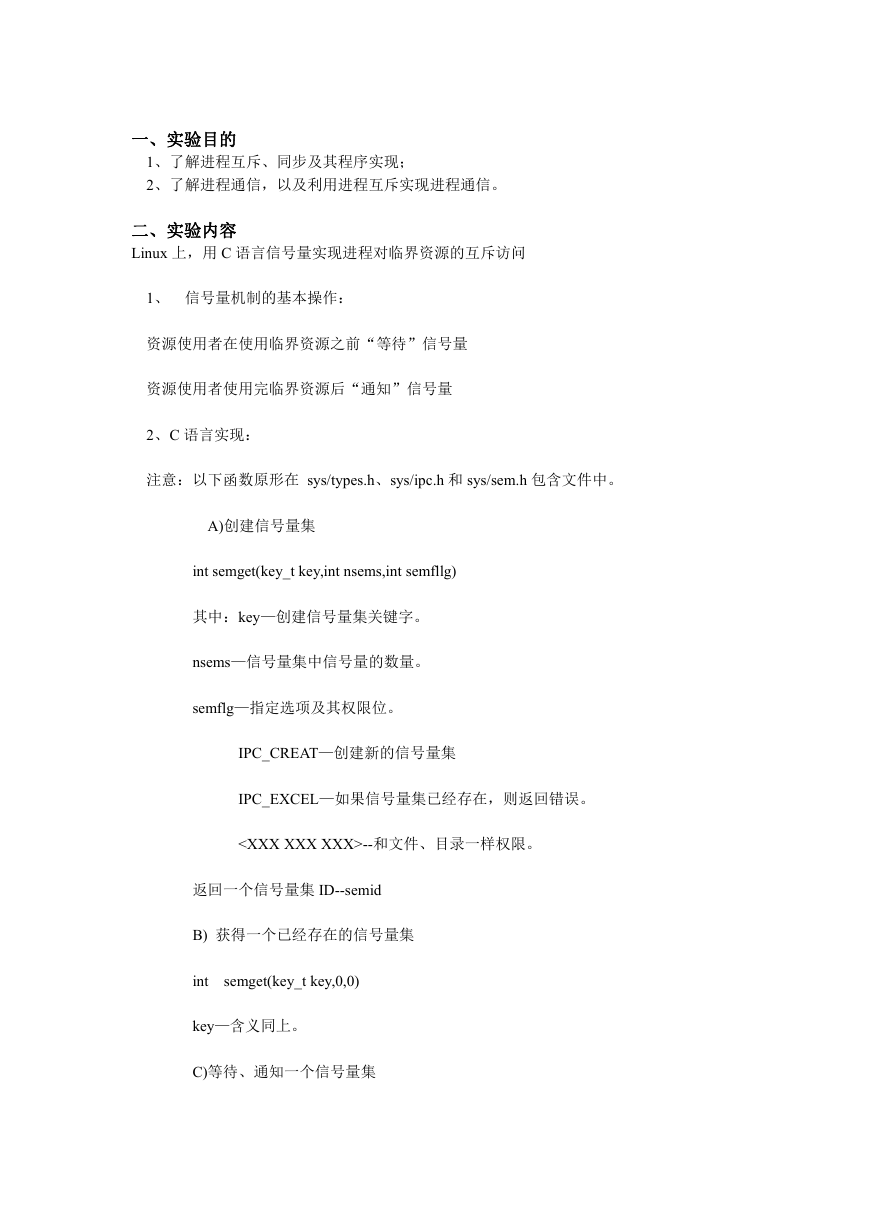
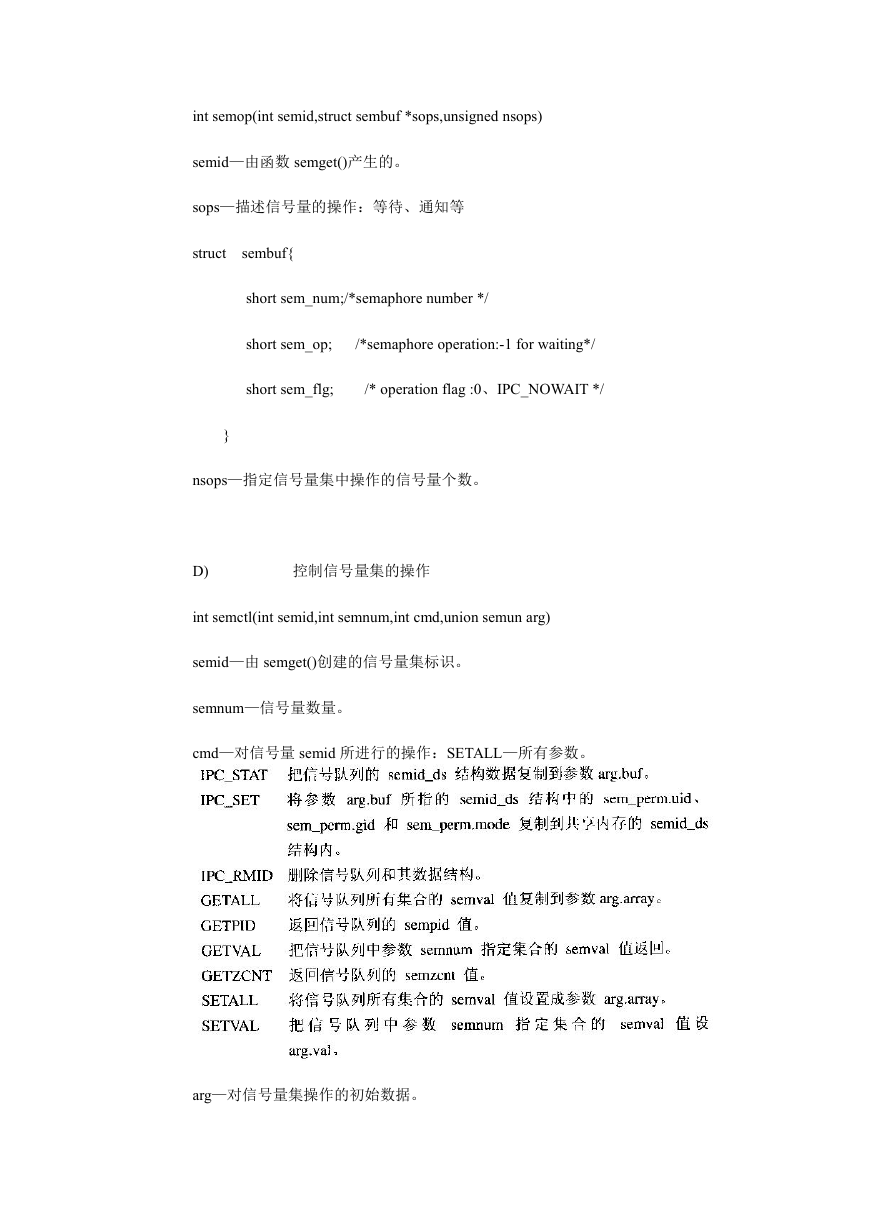
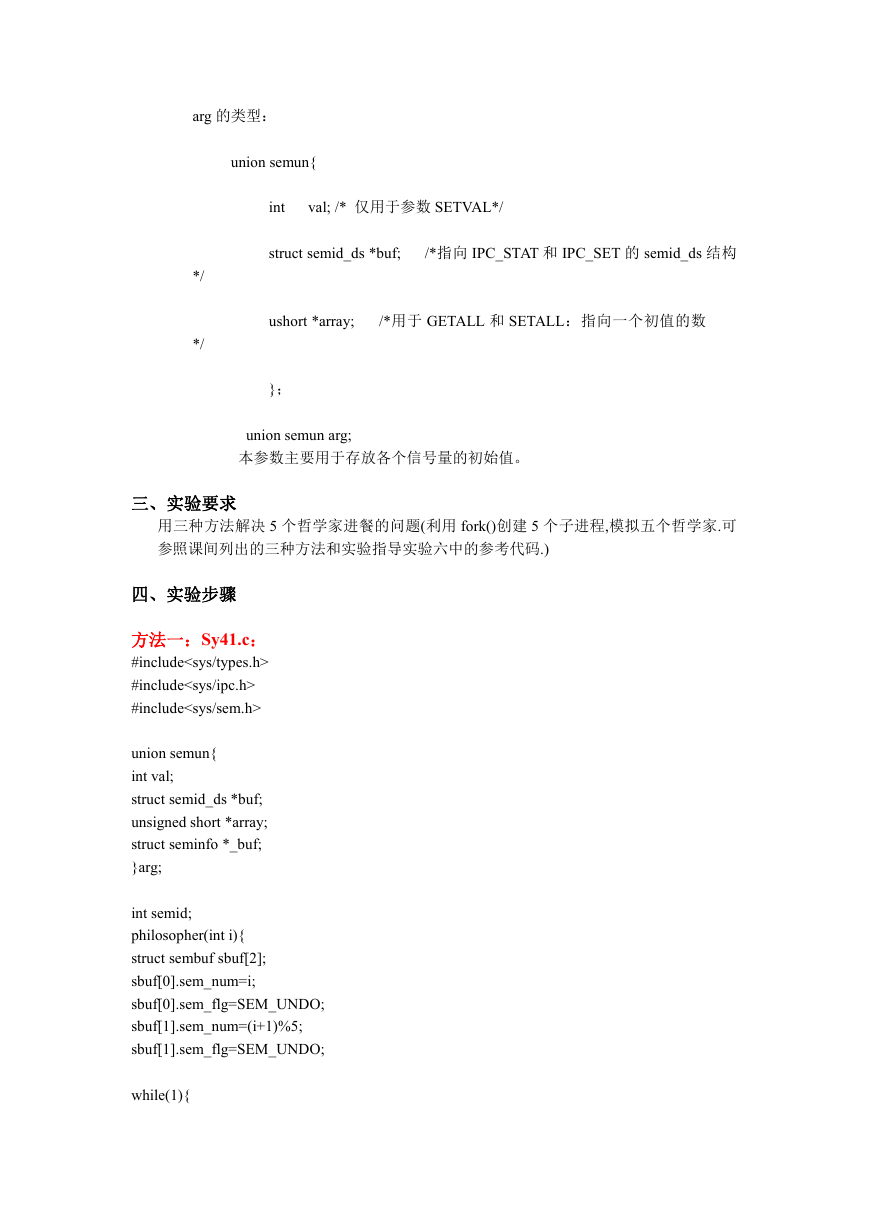
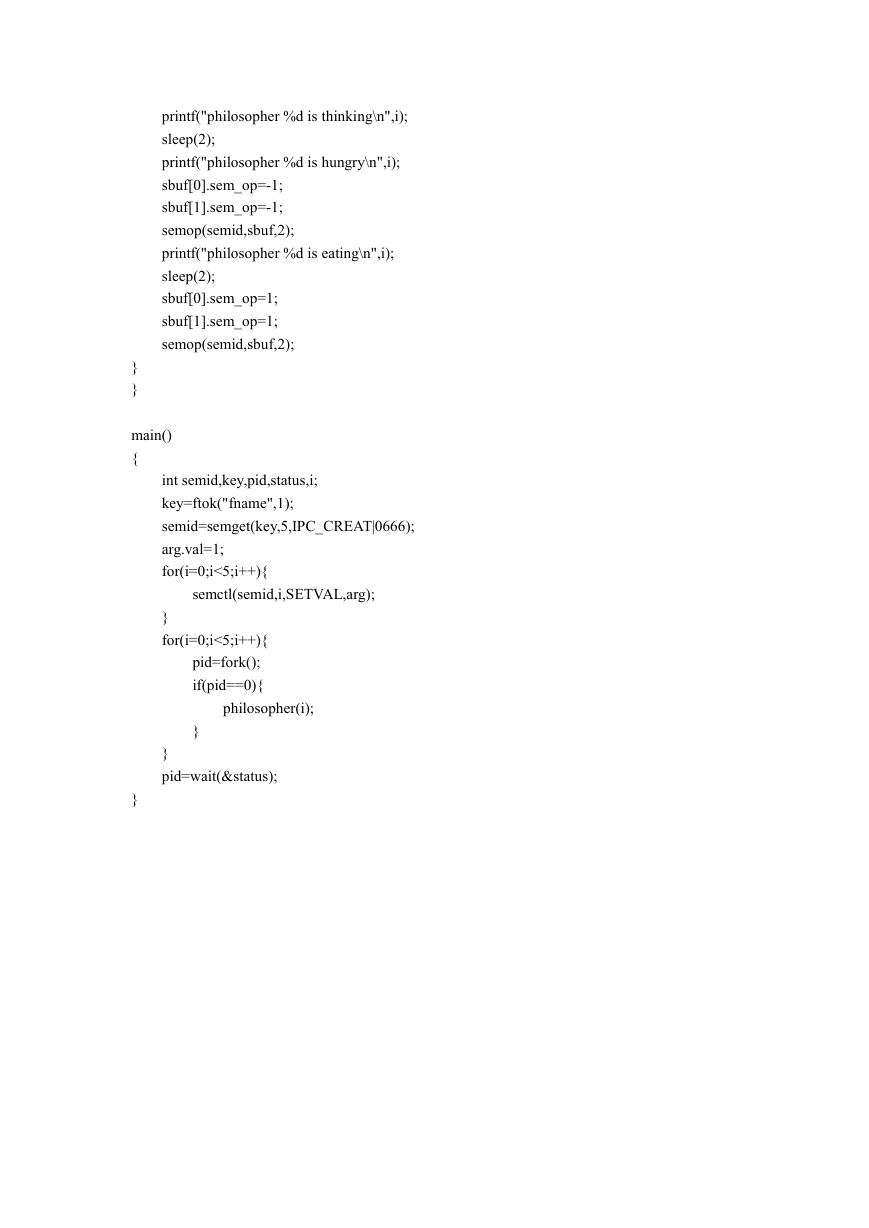
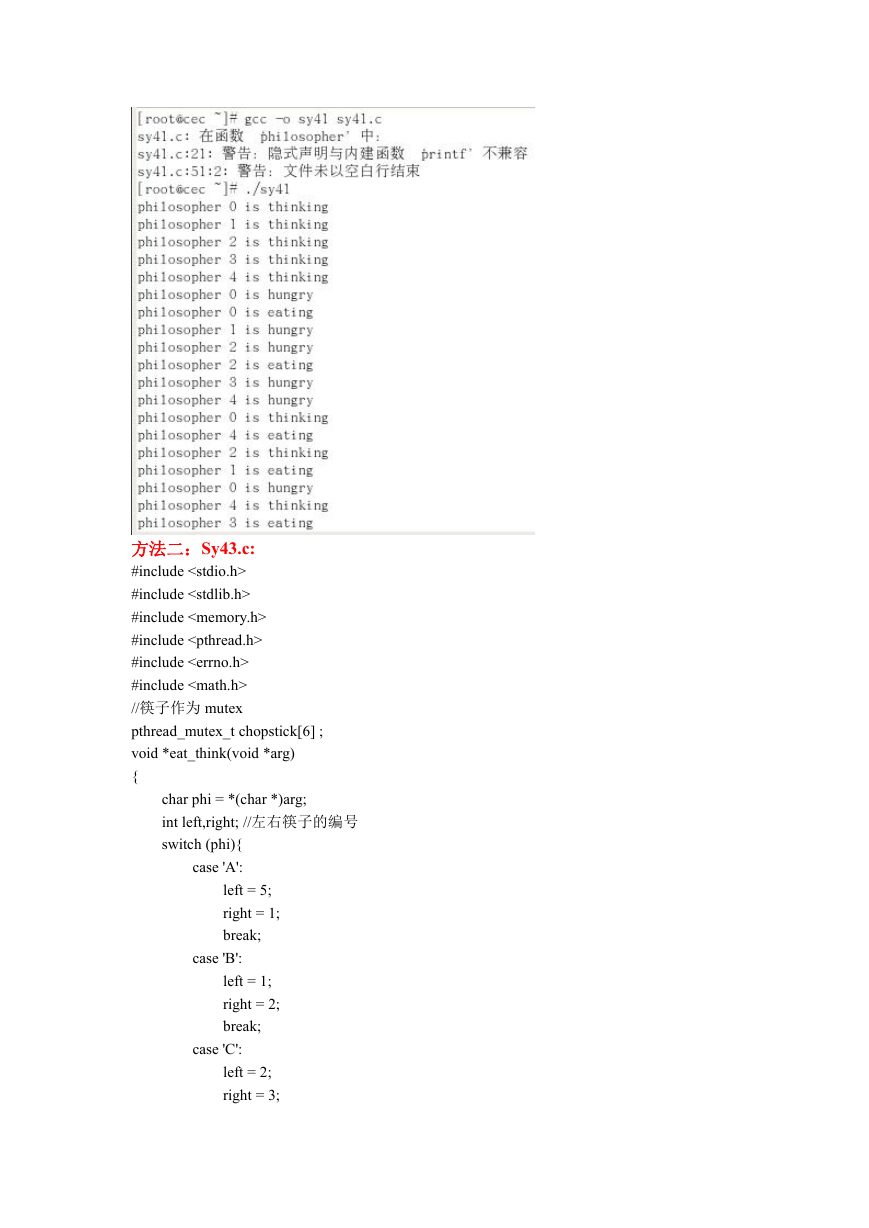
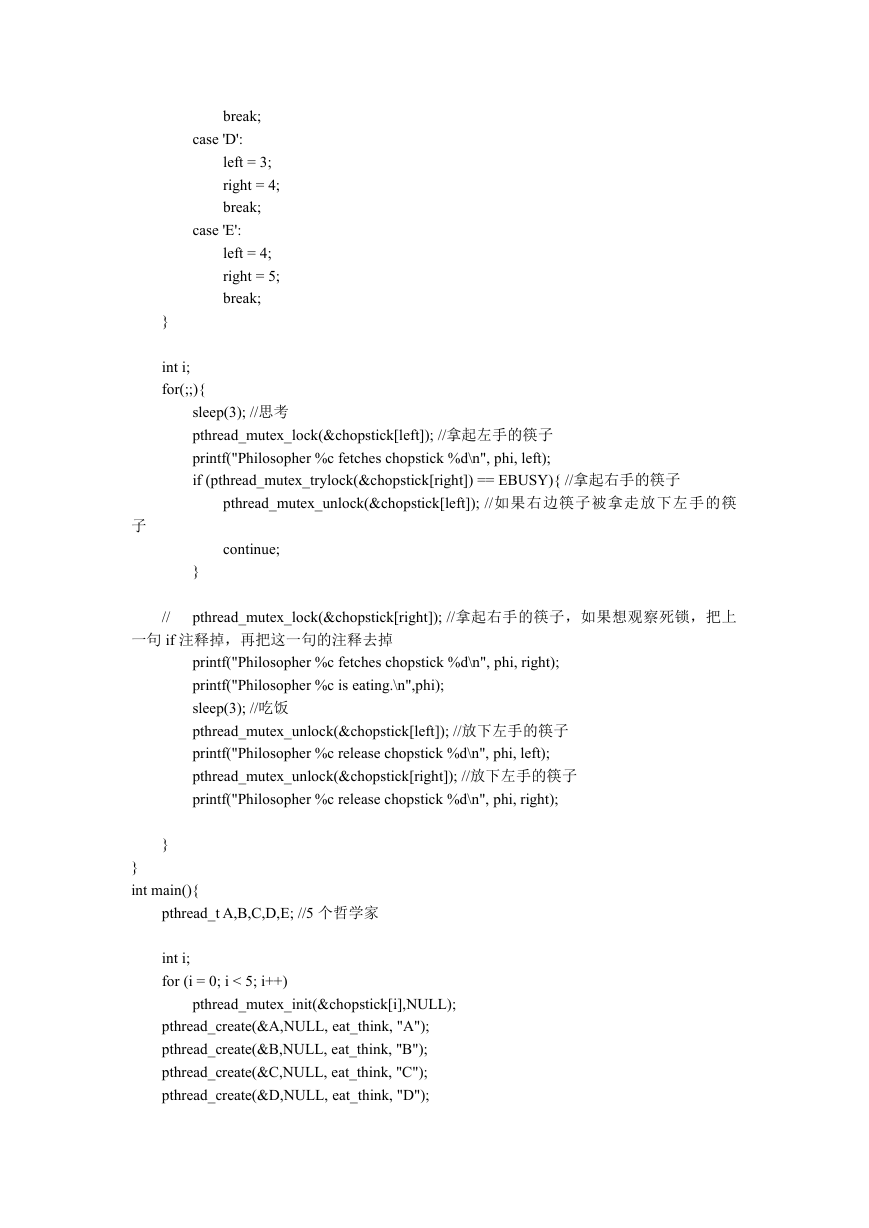
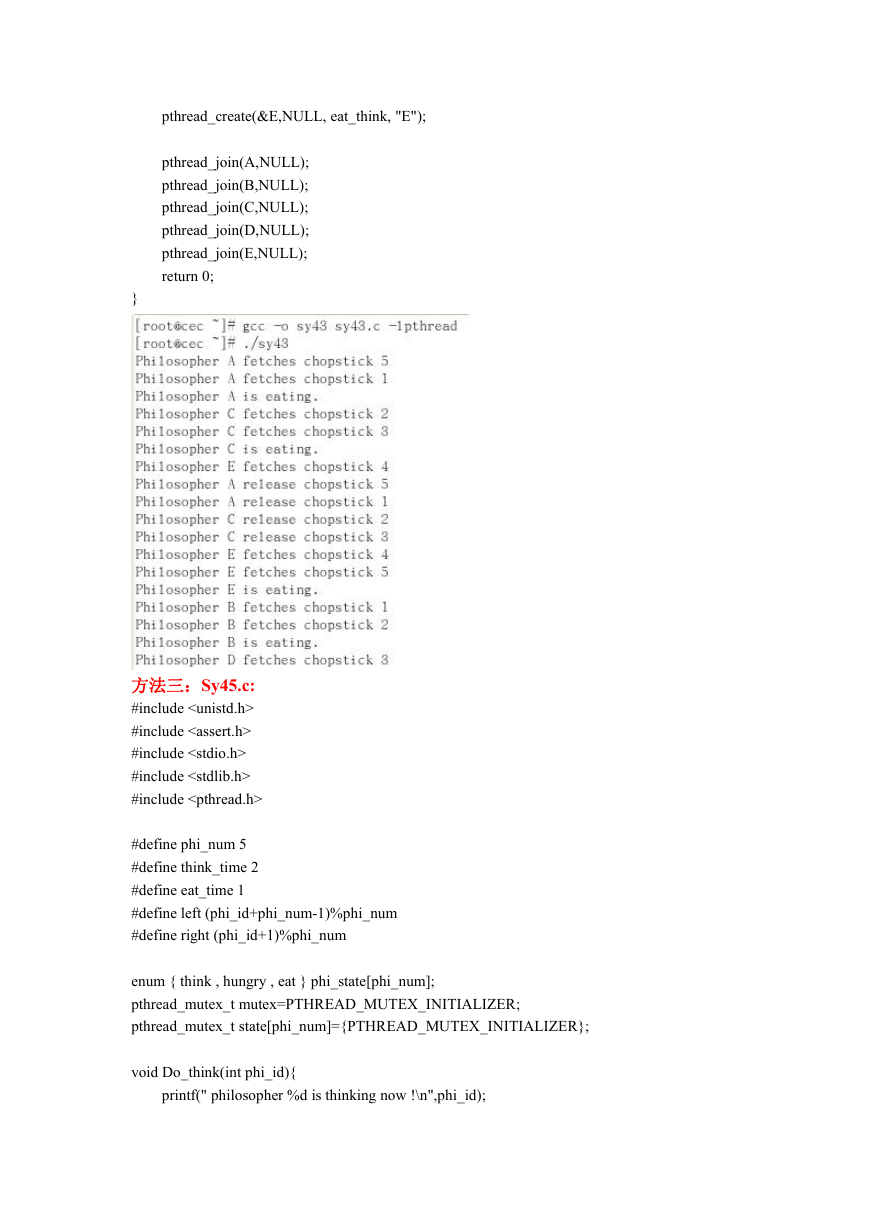
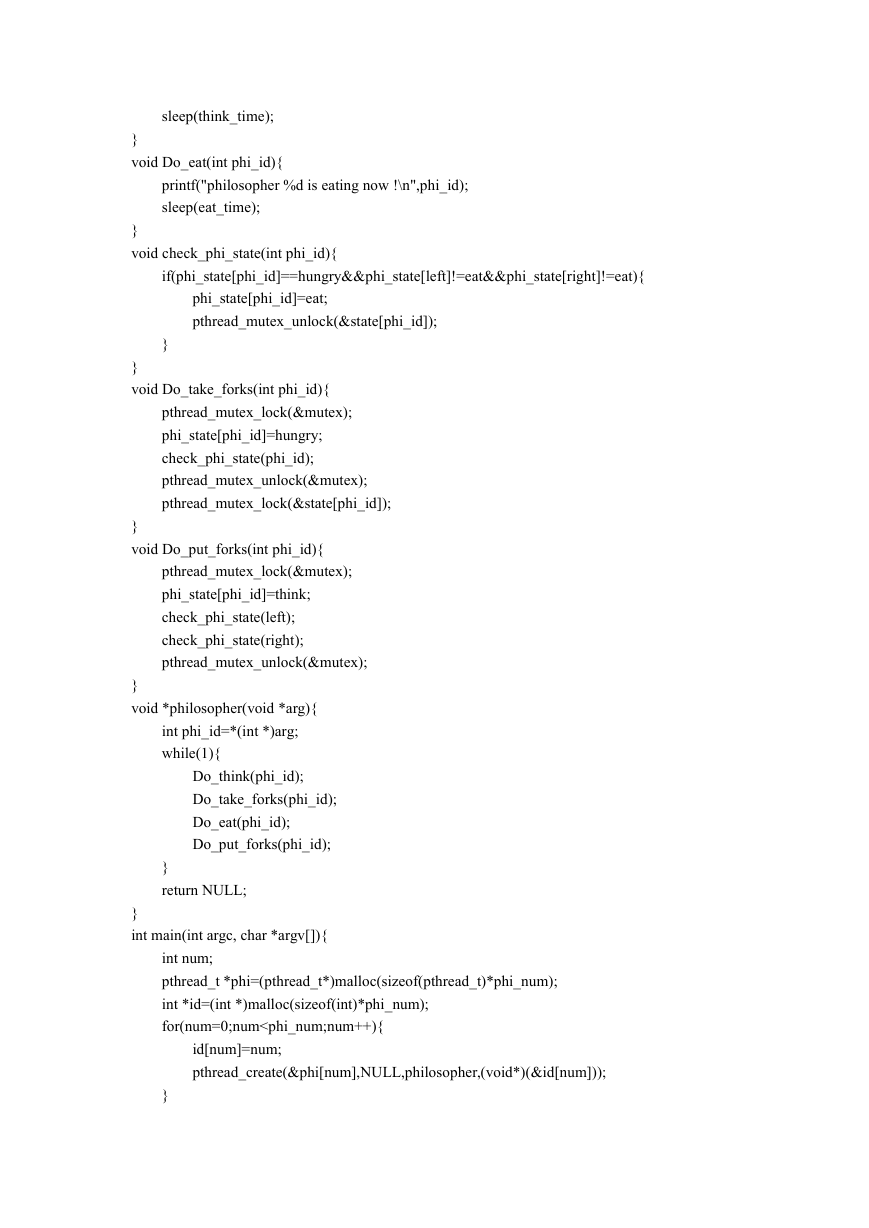








 2023年江西萍乡中考道德与法治真题及答案.doc
2023年江西萍乡中考道德与法治真题及答案.doc 2012年重庆南川中考生物真题及答案.doc
2012年重庆南川中考生物真题及答案.doc 2013年江西师范大学地理学综合及文艺理论基础考研真题.doc
2013年江西师范大学地理学综合及文艺理论基础考研真题.doc 2020年四川甘孜小升初语文真题及答案I卷.doc
2020年四川甘孜小升初语文真题及答案I卷.doc 2020年注册岩土工程师专业基础考试真题及答案.doc
2020年注册岩土工程师专业基础考试真题及答案.doc 2023-2024学年福建省厦门市九年级上学期数学月考试题及答案.doc
2023-2024学年福建省厦门市九年级上学期数学月考试题及答案.doc 2021-2022学年辽宁省沈阳市大东区九年级上学期语文期末试题及答案.doc
2021-2022学年辽宁省沈阳市大东区九年级上学期语文期末试题及答案.doc 2022-2023学年北京东城区初三第一学期物理期末试卷及答案.doc
2022-2023学年北京东城区初三第一学期物理期末试卷及答案.doc 2018上半年江西教师资格初中地理学科知识与教学能力真题及答案.doc
2018上半年江西教师资格初中地理学科知识与教学能力真题及答案.doc 2012年河北国家公务员申论考试真题及答案-省级.doc
2012年河北国家公务员申论考试真题及答案-省级.doc 2020-2021学年江苏省扬州市江都区邵樊片九年级上学期数学第一次质量检测试题及答案.doc
2020-2021学年江苏省扬州市江都区邵樊片九年级上学期数学第一次质量检测试题及答案.doc 2022下半年黑龙江教师资格证中学综合素质真题及答案.doc
2022下半年黑龙江教师资格证中学综合素质真题及答案.doc